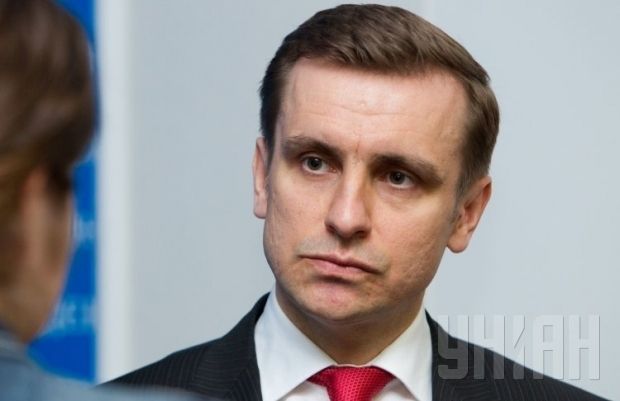
Kyiv's Ambassador to EU: Brussels has to tell EU citizens why they must pay for peace in Ukraine
Ukraine’s Ambassador to the European Union, Kostyantyn Yeliseev, tells UNIAN when to expect an EU decision to scrap visas for Ukrainians, what prevents the Ukraine-EU Association agreement from going ahead in full, and why the EU should stand firm with Ukraine against Russia.
What were the year’s milestones in terms of Ukraine-EU relations?
In the last year we clearly saw that the EU has become a key external supporter of Ukraine’s sovereignty and territorial integrity. Not the UN, nor the OSCE, nor any other international organization, [is supporting Ukraine like] the EU. No Ukrainian security strategy has ever before considered the EU as an external factor for supporting Ukraine’s national security. But it is the EU which has become a restraining factor against the Kremlin’s brutal, aggressive policies.
Will this continue this year, given the divisions among the EU member states, some of whom have already raised the question of relaxing sanctions against Russia?
This year, the EU faces the important challenge of preserving a united and solid position on the Ukrainian issue. It is not an easy task in the wake of the onslaught of Russian propaganda, which is aimed at spliting, dividing the EU member states and their foreign policy toward Ukraine. That is why supporting and preserving the EU’s solid support for Ukraine’s defending its territorial integrity and sovereignty on the basis of the president’s peace plan will become our key priority. That’s the first thing.
Secondly, it is important for the EU to focus on a range of issues which, in my opinion, can could deescalate the situation in the Donbas and subsequently contribute to the recovery of Crimea. And І think it is not sanctions that is the top priority, but providing Ukraine with massive political, financial, economic, humanitarian and even legal aid. A stable and strong Ukraine is the best guarantee for us to stand up for our national interests in the face of Russian aggression. This is what Moscow fears most and wants to prevent from happening.
And why should the EU do it?
Today, nobody is safe from Russian troops, who could violate the borders of some European countries tomorrow, even despite them being members of NATO. My position is that one should not be naïve. I doubt that the soldiers from the large NATO members will defend the smaller NATO states against Russian aggression, which may come in the shape of a ‘hybrid war’, involving ‘little green men’, as it would be rather difficult to determine whether the Alliance’s Article 5 had been violated.
In 2018, Europe will celebrate the 100th anniversary of the end of World War 1. In that very period, though for a very short time – from 1918 until 1919 - Ukraine was independent. But then large European countries, having signed the Treaty of Versailles, gave preference to the large and influential, albeit unpredictable Bolshevik Russia, and, as a result the young independent Ukraine vanished. Ukrainian independence has in fact become a pawn in the game of the great European powers. I do not draw direct parallels, but the comparisons inevitably come to mind.
Today, the fate of the European Union as a project is in fact being decided upon. Brussels must urgently develop a strategy to communicate with its citizens and explain to them clearly and precisely why they have to pay for peace and stability in Ukraine. Everyone should remember that peace is priceless.
And what about the direct dialogue with Russia which is promoted by Madame Mogherini, the High Representative of the EU for foreign affairs and security policy?
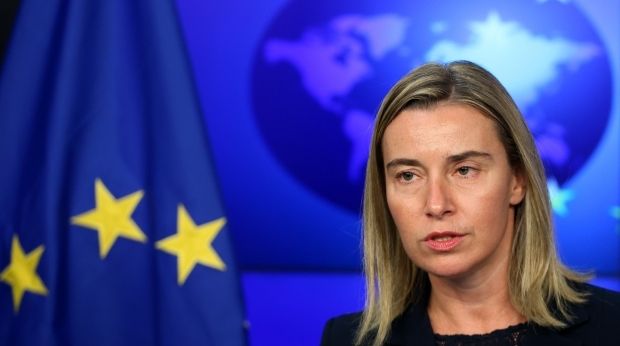
Since [Federica] Mogherini’s appointment as EU High Commissioner on October 1, 2014, we have been seeing a certain shift in emphasis in her office’s position toward the conflict in Ukraine. It was not only noticed by the Ukrainian side, but also by the other partners. We truly hope that she will not repeat the mistakes she made as Italy’s foreign minister when, in the wake of Russia’s audacious aggression against Ukraine, she still went to Moscow, inviting Putin to take part in the ASEM (Asia-Europe summit in Milan on October 16-17). I suppose that in the present circumstances the idea of inviting Russia to a dialogue to resolve the conflict looks like condoning the aggressor, and it is doomed to failure.
Why do you think so?
Because, as they say, we’ve been there, and done that. I am talking about the War in Georgia in 2008, when the EU decided to adopt the tactics of involving Moscow in a dialogue in order to induce Russia to follow the Medvedev-Sarkozy peace plan, which had been accepted by all parties to the conflict. Shortly after, they were allegations of Russia’s non-compliance with this plan. Finally, the issue of Georgia’s territorial integrity has never been resolved. Does this remind you of anything?
But despite this, in 2010, the EU offered Russia a new policy of partnership for modernization, then boosted talks on a new enhanced agreement, and started negotiations on a visa-free regime. And after a few years, Russia’s president illegally annexed Crimea and keeps on terrorizing not only Ukraine, but also the whole of Europe.
[Ukraine’s] European partners must not cherish the illusion that the Russian president will ever step back – he will continue preventing Ukraine from implementing its sovereign European choice.
What is happening is, in fact, a geopolitical confrontation between two sets of values: European values on the one hand, and on the other hand - totalitarianism and kleptocracy. The future of the whole European Union depends on how the situation in Ukraine is resolved.
The EU plans to start a discussion on developing a new strategy toward Russia. What are Ukraine’s expectations in this regard?
Over the past five years, we have repeatedly stressed that the main drawback in Russia-EU relations is the lack of an adequate, consolidated and clear strategy for such relations. We would really like to see such a strategy developed as soon as possible. However, before that, the EU should clearly define the strategic placement of Ukraine in its priorities. Once that is done, they can form a proper strategy toward Russia.
What are your predictions for the EU visa-free regime for Ukraine?
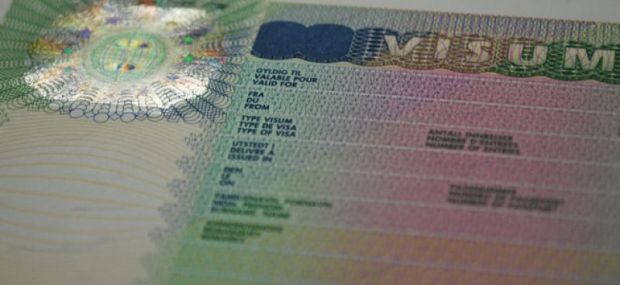
Our priority is for the European Commission to announce a positive decision on granting Ukraine a visa-free regime before the Riga Eastern Partnership Summit on May 21-22. Then, time is needed to make a range of decisions within the EU, to make it come into force. I mean, the consent and the Council of Ministers and passing in the European Parliament are needed.
Are there any grounds to suppose that there will be a positive decision?
The next three months will be crucial in terms of whetherwe achieve this or not. During this period, intensive European Commission expert missions to Ukraine will be taking place to verify Ukraine’s implementation of the second phase of the Action Plan, and afterward, the EC will prepare a report. In this respect, it is important to immediately resolve the issue of biometric passports.
If it comes to deciding this issue in the EU Council and in the European Parliament, how is it possible to ensure there is a favorable environment for a positive decision, given the intensification of the Russian lobby?
Two factors are important for us in this regard: the position of each EU member and the position of the European Parliament. Of course, the EP will be of key significance in terms of deciding on [granting a] visa-free regime, providing Ukraine with additional macro-financial aid and the general political support against Russia’s aggression.
After the 2014 elections, we managed to establish an active dialogue with the new convocation of the European Parliament, we started the work of the EU-Ukraine Association parliamentary committee, and created an informal group of friends called the “Friends of European Ukraine” in the European Parliament, which already contains close to a hundred MPs - we managed to create a pro-Ukrainian majority cell in the EP. The fact that around 570 MPs voted in favor of ratifying the Association Agreement on September 16 shows that there is a stable pro-Ukrainian majority in the European Parliament.
But the Russian propaganda machine has also significantly intensified in recent months in the European Parliament. Besides, the Russians have no qualms about financially motivating certain political forces and certain MPs.
Not long ago, Russia's permanent representative to the EU, Mr. Chizhov, said that Russia was happy about the delay in the implementation of the Association Agreement in regard with the free trade area, and would favor the delay’s prolongation. Should Ukraine therefore expect new challenges?
A key priority for the coming year should be creating appropriate conditions for the effective implementation of trade part of the Association agreements starting January 1, 2016. In this regard, we have agreed on three key principles with the EU. There will be no new negotiations; and there shall be absolutely no amendments to the Agreement, no matter how much someone may want them. Secondly, we are against further delay of the implementation of trading and economic part of the agreement after December 31, 2015. Third, Ukraine and the EU are ready for constructive discussions with Russia on the current parameters of the application of the trading part of the agreement regarding such issues as technical trading barriers, customs administration, and sanitary and phytosanitary measures. I would like this position to be strictly adhered to by all parties.
In other words, will Ukraine undoubtedly begin the implementation of the economic part of the Association agreement?
A possible challenge for us is the ratification of the Agreement by all EU member states. As of today, it has only been ratified by 11 states. This is not only a legal, but also a political matter, because the sooner the agreement is ratified and comes into force, the stronger will be the position of Ukraine in negotiations with other partners, including Russia, and the less illusions Moscow will harbor to prevent us from starting the process of implementation of the agreement’s trading part. So I hope that the large EU member states, which we expect the ratification from - these are Germany, Britain, and France - appreciate their own political responsibilities.
What is your attitude to Russia’s offer to start negotiations on creating a free trade zone between the Eurasian Union and the EU?
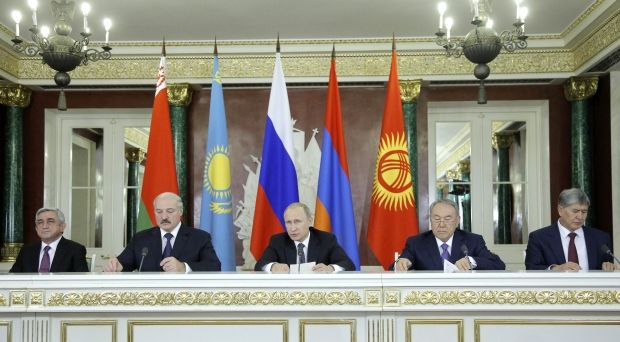
Ukraine has always supported the prospect of creating a free trade zone from Lisbon to Vladivostok, which would be based on the WTO principles and regulations, and which would comply with the fundamental rules of international law. It was the Ukrainian side that initiated the meeting in Minsk on August 26, 2014 to resolve the situation in eastern Ukraine, which, in fact, was the first ever event in the format of the EU –Ukraine – the Eurasian trio (Belarus-Kazakhstan-Russia).
However, in current circumstances, especially in the wake of Russia’s ongoing audacious aggression against Ukraine, it is too early to talk about the real prospects of launching talks between the EU and the Eurasian Union on a creating a free trade zone.
First, Russia must immediately stop its aggression against Ukraine’s territorial integrity and sovereignty, including taking steps to stabilize the situation in the Donbas and discontinuing the illegal annexation of Crimea and Sevastopol, and also properly compensating Ukraine for the damage it has caused. Second, Russia must strictly comply with all of its commitments under the WTO. Third, Russia must abolish unjustified trade restrictions and protectionist measures against Ukraine, countries of the Eastern Partnership and the EU, which were introduced recently at the bilateral level, contrary to the WTO regulations. Fourth, all members of the Eurasian Union must become WTO members.
It is principally important that the launch of the dialogue comes in a package with resolving the “Ukrainian issue.”
Is it already clear when Ukraine and the EU will resume talks with Russia on gas issues?
I do not exclude that dialogue on this issue will be soon restored. We have to decide what to do next: to move to a so-called summer package and to reach agreements on this matter, or to wait for the results of the Stockholm arbitration. But this process should not only take into account the position of the Ukrainian side, but also that of the EU and Russia.
Our principled position is that any talks with Russia on problem issues must be held only with the mediation or participation of the EU.
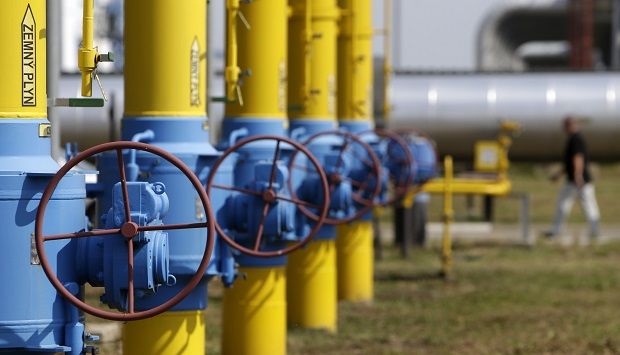
I also want to say that we are getting ready to hold an international investment conference on reforming Ukraine’s gas market. This is not just about an opportunity to determine who will manage our gas transportation system and on what conditions, but also concerns the use of our facilities, including underground gas storages. This conference may take place in the beginning of 2015, most probably in Brussels.
I want to stress that the year 2015 is important for us, as the implementation of the third energy package starts January 1. This concerns creating an independent regulator, and the clear separation of the functions of the management systems for the transportation, storage and supply of gas.
What other events should we should expect this year?
We believe that political dialogue will be no less intensive than last year, [when there were] 139 delegations, half of them at the ministerial level and above. As for key event:, there will be the first visit of the newly appointed President of the European Commission [Jean-Claude] Juncker to Ukraine in early 2015, Ukraine-EU summit which will be held in Kyiv, an international conference on support for Ukraine, the meeting in the format of the European Commission College – the Cabinet of Ministers of Ukraine. Also, the visits of Ukraine’s president to Brussels will take place, and the date of the next meeting of the Association Council will be set. Besides, we have almost agreed on the date of the inaugural meeting of the EU-Ukraine Association parliamentary Committee – that is, in the beginning of February. And in the coming weeks, there will be the first visit of the Speaker of the Ukrainian Parliament Volodymyr Hroisman to Brussels.
Iryna Somer, Brussels

